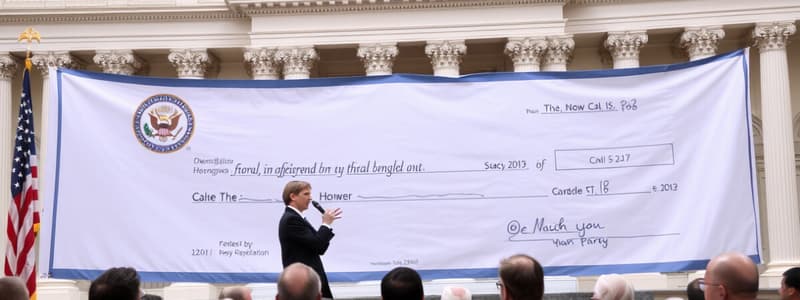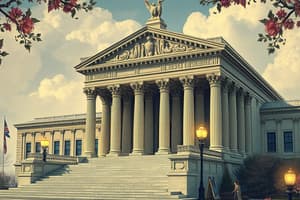Podcast
Questions and Answers
What was the dominant model of federalism starting with the New Deal?
What was the dominant model of federalism starting with the New Deal?
cooperative
Which of the following is an example of a categorical grant?
Which of the following is an example of a categorical grant?
Funds provided by Congress to the states to enhance science instruction in a low-income area.
How many general types of federal grants exist?
How many general types of federal grants exist?
three
Article VI of the U.S. Constitution establishes that federal law is __________ in conflicts between federal and state law.
Article VI of the U.S. Constitution establishes that federal law is __________ in conflicts between federal and state law.
Dillon's Rule states that all local governments must be authorized by which of the following?
Dillon's Rule states that all local governments must be authorized by which of the following?
What are reserved powers?
What are reserved powers?
In 2014, what did the Supreme Court decide about the use of prayers to open government meetings?
In 2014, what did the Supreme Court decide about the use of prayers to open government meetings?
In Barron v. Baltimore, the Supreme Court held that the Bill of Rights limits __________, not __________, activity.
In Barron v. Baltimore, the Supreme Court held that the Bill of Rights limits __________, not __________, activity.
Prior to the ratification of the Constitution, the United States was governed by the Articles of __________.
Prior to the ratification of the Constitution, the United States was governed by the Articles of __________.
Which of the following is an example of procedural due process?
Which of the following is an example of procedural due process?
The free exercise clause guarantees that the national government will not interfere with which of the following?
The free exercise clause guarantees that the national government will not interfere with which of the following?
Dillon's Rule states __________.
Dillon's Rule states __________.
The power of both the state and federal governments to levy taxes is an example of what type of power?
The power of both the state and federal governments to levy taxes is an example of what type of power?
Convicted criminals cannot have their sentences increased when a new law calls for tougher penalties due to a prohibition against __________.
Convicted criminals cannot have their sentences increased when a new law calls for tougher penalties due to a prohibition against __________.
The doctrine of prior restraint says that the government cannot prevent speech or publication __________.
The doctrine of prior restraint says that the government cannot prevent speech or publication __________.
Which of the following clauses requires states to return criminals to states where they have been convicted or are to stand trial?
Which of the following clauses requires states to return criminals to states where they have been convicted or are to stand trial?
The Sixth Amendment sets out basic requirements for which type of due process?
The Sixth Amendment sets out basic requirements for which type of due process?
A defamatory, false written statement is __________; the same statement spoken aloud is __________.
A defamatory, false written statement is __________; the same statement spoken aloud is __________.
__________ powers are shared by the federal and state governments.
__________ powers are shared by the federal and state governments.
The concept of nullification was quashed by which of the following?
The concept of nullification was quashed by which of the following?
Which of the following categories of grants did President Lyndon Johnson favor?
Which of the following categories of grants did President Lyndon Johnson favor?
Which of the following best exemplifies cooperative federalism?
Which of the following best exemplifies cooperative federalism?
Which of the following is an example of a reserved power of the states?
Which of the following is an example of a reserved power of the states?
Which of the following is a power specifically denied the states by the Constitution?
Which of the following is a power specifically denied the states by the Constitution?
What type of due process protects citizens from arbitrary or unjust state or federal laws?
What type of due process protects citizens from arbitrary or unjust state or federal laws?
Which rule bars the use of illegally seized evidence at trial?
Which rule bars the use of illegally seized evidence at trial?
In the late 1980s, what caused the Rehnquist Court to start to restrict Congress's ability to regulate various areas of the economy?
In the late 1980s, what caused the Rehnquist Court to start to restrict Congress's ability to regulate various areas of the economy?
What kind of speech is by its very utterance intended to inflict injury or incite an immediate breach of peace?
What kind of speech is by its very utterance intended to inflict injury or incite an immediate breach of peace?
Which of the following is an enumerated power of the national government?
Which of the following is an enumerated power of the national government?
What did Abington School District v. Schempp find to be unconstitutional?
What did Abington School District v. Schempp find to be unconstitutional?
Inciting a fight by using threats and profanity could be considered __________, which is not a protected type of speech.
Inciting a fight by using threats and profanity could be considered __________, which is not a protected type of speech.
Which amendment gave Congress the power to levy and collect federal taxes on income?
Which amendment gave Congress the power to levy and collect federal taxes on income?
Flashcards are hidden until you start studying
Study Notes
Federalism and Grants
- Cooperative federalism emerged as the dominant model after the New Deal.
- Categorical grants target specific areas, such as enhancing science instruction in low-income schools.
- Three general types of federal grants exist: categorical, block, and project grants.
Constitution and Law
- Article VI establishes that federal law is supreme in conflicts with state law.
- Dillon's Rule mandates that local governments must be authorized by state governments.
- Reserved powers are those granted to states or people not explicitly delegated to the national government.
Supreme Court Decisions
- In 2014, the Supreme Court allowed prayers at government meetings, even if favoring one religion.
- Barron v. Baltimore ruled that the Bill of Rights limits federal, not state, actions.
- Abington School District v. Schempp deemed state-mandated Bible reading unconstitutional.
Rights and Due Process
- Procedural due process includes the right to a speedy trial.
- The free exercise clause prohibits the national government from interfering with religion.
- The Sixth Amendment outlines requirements for procedural due process.
- Substantive due process protects citizens from unjust laws.
Power Dynamics
- Concurrent powers, such as levying taxes, are shared between state and federal governments.
- States cannot impose ex post facto laws, which increase penalties retroactively.
- The Civil War effectively quashed the concept of nullification.
- Passing bills of attainder is specifically denied to states by the Constitution.
Speech and Expression
- The doctrine of prior restraint prevents the government from banning speech or publication before it occurs.
- Defamation splits into libel (written) and slander (spoken).
- Fighting words, intended to incite violence, are not protected speech.
- The exclusionary rule prohibits the use of illegally seized evidence in court.
Political Context
- The Rehnquist Court in the late 1980s began limiting Congress's regulatory ability due to a focus on states' rights.
- Lyndon Johnson favored categorical grants as part of his Great Society initiatives.
Examples and Concepts
- An example of a reserved power is imposing the death penalty.
- Enumerated powers, such as coining money, belong to the national government.
- The extradition clause requires states to return criminals to the states where they were convicted or are on trial.
Studying That Suits You
Use AI to generate personalized quizzes and flashcards to suit your learning preferences.




